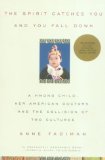
A Hmong Child, Her American Doctors, and the Collision of Two Cultures
by Anne Fadiman
When three-month-old Lia Lee arrived at the county hospital emergency room in Merced, California, a chain of events was set in motion from which neither she nor her parents nor her doctors would ever recover. Lia's parents, Foua and Nao Kao, were part of a large Hmong community in Merced, refugees from the CIA-run "Quiet War" in Laos. The Hmong, traditionally a close-knit and fiercely people, have been less amenable to assimilation than most immigrants, adhering steadfastly to the rituals and beliefs of their ancestors. Lia's pediatricians, Neil Ernst and his wife, Peggy Philip, cleaved just as strongly to another tradition: that of Western medicine. When Lia Lee entered the American medical system, diagnosed as an epileptic, her story became a tragic case history of cultural miscommunication.
Parents and doctors both wanted the best for Lia, but their ideas about the causes of her illness and its treatment could hardly have been more different. The Hmong see illness and healing as spiritual matters linked to virtually everything in the universe, while the medical community marks a division between body and soul, and concerns itself almost exclusively with the former. Lia's doctors ascribed her seizures to the misfiring of her cerebral neurons; her parents called her illness, qaug dab peg--the spirit catches you and you fall down--and ascribed it to the wandering of her soul. The doctors prescribed anticonvulsants; her parents preferred animal sacrifices.
"Superb, informal cultural anthropology — eye-opening, readable, utterly engaging." - Carole Horn, The Washington Post Book World.
"A brilliant study in cross-cultural medicine." - Kirkus Reviews.
"This book is a moving cautionary tale about the importance of practicing 'cross-cultural medicine,' and of acknowledging, without condemning, differences in medical attitudes of various cultures." - Publishers Weekly.
"In a shrinking world, this painstakingly researched account of cultural dislocation has a haunting lesson for every healthcare provider." - Library Journal.
"The suspense of the child's precarious health, the understanding characterization of the parents and doctors, and especially the insights into Hmong culture make this a very worthwhile read." - School Library Journal.
"This fine book recounts a poignant tragedy ... It has no heroes or villains, but it has an abundance of innocent suffering, and it most certainly does have a moral ... [A] sad, excellent book." - Melvin Konner, The New York Times Book Review.
This information about The Spirit Catches You and You Fall Down was first featured
in "The BookBrowse Review" - BookBrowse's membership magazine, and in our weekly "Publishing This Week" newsletter. Publication information is for the USA, and (unless stated otherwise) represents the first print edition. The reviews are necessarily limited to those that were available to us ahead of publication. If you are the publisher or author and feel that they do not properly reflect the range of media opinion now available, send us a message with the mainstream reviews that you would like to see added.
Any "Author Information" displayed below reflects the author's biography at the time this particular book was published.
Winner of the National Book Critics Circle Award for Nonfiction.




He who opens a door, closes a prison
Click Here to find out who said this, as well as discovering other famous literary quotes!
Your guide toexceptional books
BookBrowse seeks out and recommends the best in contemporary fiction and nonfiction—books that not only engage and entertain but also deepen our understanding of ourselves and the world around us.